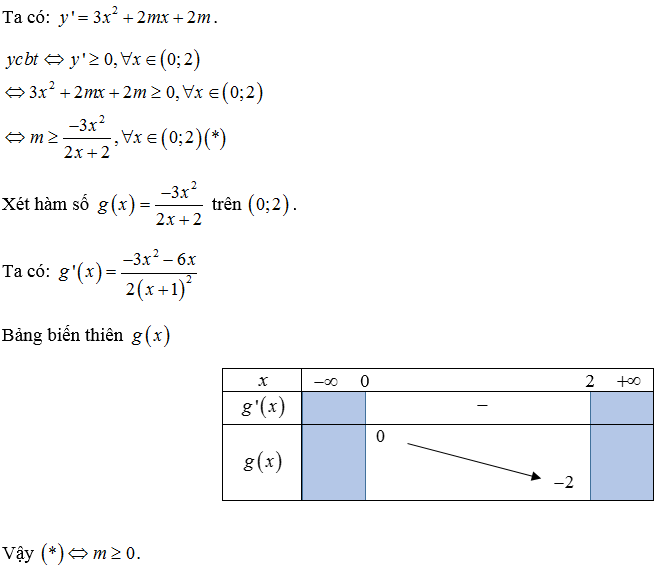Hãy nhập câu hỏi của bạn vào đây, nếu là tài khoản VIP, bạn sẽ được ưu tiên trả lời.

a: \(y=-x^2+2x+3\)
y>0
=>\(-x^2+2x+3>0\)
=>\(x^2-2x-3< 0\)
=>(x-3)(x+1)<0
TH1: \(\left\{{}\begin{matrix}x-3>0\\x+1< 0\end{matrix}\right.\)
=>\(\left\{{}\begin{matrix}x>3\\x< -1\end{matrix}\right.\)
=>\(x\in\varnothing\)
TH2: \(\left\{{}\begin{matrix}x-3< 0\\x+1>0\end{matrix}\right.\)
=>\(\left\{{}\begin{matrix}x< 3\\x>-1\end{matrix}\right.\)
=>-1<x<3
\(y=\dfrac{1}{2}x^2+x+4\)
y>0
=>\(\dfrac{1}{2}x^2+x+4>0\)
\(\Leftrightarrow x^2+2x+8>0\)
=>\(x^2+2x+1+7>0\)
=>\(\left(x+1\right)^2+7>0\)(luôn đúng)
b: \(y=-x^2+2x+3< 0\)
=>\(x^2-2x-3>0\)
=>(x-3)(x+1)>0
TH1: \(\left\{{}\begin{matrix}x-3>0\\x+1>0\end{matrix}\right.\)
=>\(\left\{{}\begin{matrix}x>3\\x>-1\end{matrix}\right.\)
=>x>3
TH2: \(\left\{{}\begin{matrix}x-3< 0\\x+1< 0\end{matrix}\right.\)
=>\(\left\{{}\begin{matrix}x< 3\\x< -1\end{matrix}\right.\)
=>x<-1
\(y=\dfrac{1}{2}x^2+x+4\)
\(y< 0\)
=>\(\dfrac{1}{2}x^2+x+4< 0\)
=>\(x^2+2x+8< 0\)
=>(x+1)2+7<0(vô lý)

\(y=2+\dfrac{6}{x-3}\)
\(P=3x\left(2+\dfrac{6}{x-3}\right)+2x+2+\dfrac{6}{x-3}\)
\(P=8x+2+\dfrac{18x}{x-3}+\dfrac{6}{x-3}=8x+20+\dfrac{60}{x-3}\)
\(P=8\left(x-3\right)+\dfrac{60}{x-3}+44\ge2\sqrt{\dfrac{480\left(x-3\right)}{x-3}}+44=44+8\sqrt{30}\)
\(P_{min}=44+8\sqrt{30}\) khi \(8\left(x-3\right)=\dfrac{60}{x-3}\Leftrightarrow x=\dfrac{6+\sqrt{30}}{2}\)

a: TXĐ: \(D=R\backslash\left\{-\dfrac{1}{2}\right\}\)
b: TXĐ: \(D=R\backslash\left\{-3;1\right\}\)
c: TXĐ: \(D=\left[-\dfrac{1}{2};3\right]\)

y' là đạo hàm bậc nhất của y. Bạn đọc sách toán phổ thông phần đạo hàm/ tìm max min của hàm số hoặc google search để tìm hiểu rõ hơn.

y xđ khi \(x^2-3x+1\ne0\)
\(\Leftrightarrow\left(x-\dfrac{3}{2}\right)^2-\dfrac{5}{4}\ne0\)
\(\Leftrightarrow\left[{}\begin{matrix}x\ne\dfrac{3+\sqrt{5}}{2}\\x\ne\dfrac{3-\sqrt{5}}{2}\end{matrix}\right.\)
\(Q=\left(\dfrac{3-\sqrt{5}}{2}\right)^3+\left(\dfrac{3+\sqrt{5}}{2}\right)^3+3\left(\dfrac{3-\sqrt{5}}{2}+\dfrac{3+\sqrt{5}}{2}\right)\left(\dfrac{3-\sqrt{5}}{2}.\dfrac{3+\sqrt{5}}{2}\right)-13\left(\dfrac{3-\sqrt{5}}{2}.\dfrac{3+\sqrt{5}}{2}\right)\) \(=\left(\dfrac{3-\sqrt{5}}{2}+\dfrac{3+\sqrt{5}}{2}\right)^3-13\)
\(=3^3-13=27-13=14\)

